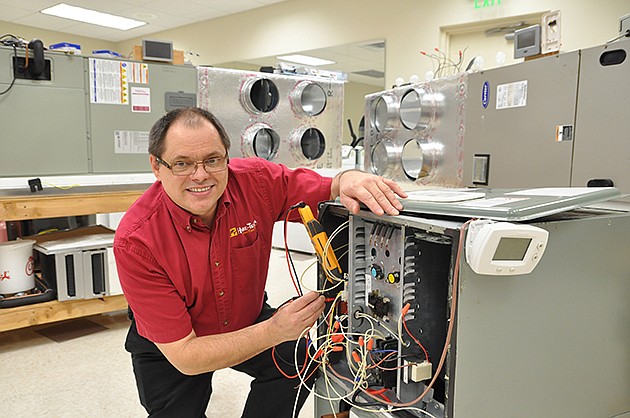- November 24, 2024
-
-
Loading

Loading

Executive Summary
Company. Home-Tech Industry. Appliance repair and installation Key. Create your own labor force with an apprenticeship program.
For Home-Tech, finding qualified people has always been a challenge — even during the recession.
But the appliance repair and installation company based in Fort Myers has cultivated technicians who have great customer-service skills and clean records with a successful apprenticeship program it presciently started 20 years ago.
Even with today's tight labor market, Home-Tech is highly selective and only seeks the best candidates. In fact, Home-Tech accepts about 2% to 3% of those who apply to the apprentice course. That's more selective than Harvard University, which accepted 5.9% of its applicants last year.
Home-Tech's challenge has as much to do with Florida's rapid growth as it does with cultural expectations that every high school graduate must attend college. As a result of these changing attitudes, fewer young people have chosen vocational trades after high school. “That created a void,” says Gary Close, the training manager for Home-Tech.
Now that experienced technicians are getting older and retiring, there are fewer young people to take their place because vocational training has been out of favor for high school graduates for the last two decades. “We're keenly feeling that 20-year gap,” says Close. “Skilled trade is very difficult to find.”
For Close, finding qualified people for the apprentice program is the equivalent of looking for needles in a haystack. Most recently, Close received about 200 applications. Of those, he interviewed 18 people and he accepted four. “I'm pretty selective on the hiring,” Close says. “It's a serious investment.”
Paid to learn
Although Home-Tech doesn't disclose what its apprentice program costs, Close estimates students at a vocational school might pay $5,000 for a comparable program. That in itself is a great recruiting tool, Close says.
But in addition to classroom work, Home-Tech apprentices ride with seasoned technicians to fix appliances in the field. “We're going to pay you while you're learning,” Close tells prospective apprentices.
“I'm paying them $12 an hour.”
Apprentices don't need any experience in appliance repair. “Attitude is what I'm looking for,” Close says. “We're looking for people who want a career.”
And, of course, applicants must have a clean record that includes no driving infractions and they must submit to a drug test. Unfortunately, Close says that eliminates a large number of people from the applicant pool.
Once they join the program, Close starts from scratch, starting with the basics of electricity. “I have to go back to seventh-grade science,” he chuckles. But he's not concerned about skills as much as he is about an apprentice's eagerness to learn. “I can work with anything but a lack of effort,” he says.
During their first two months, new apprentices go through a “boot camp.” They spend two days a week in class and three days a week in the field alongside an experienced technician. “There's nothing like the real world,” Close smiles.
After the initial boot camp, apprentices must continue their education by attending three-hour classes one evening a week for which they are not paid. “Their education is their payment,” Close says.
Once they're accepted and begin the program, Home-Tech apprentices sign a non-compete agreement pledging that they won't leave for a rival for at least a year. “We're making a big investment,” Close reasons.
Indeed, Close says it takes about a year for the company to fully recoup its investment in an apprentice, but the education continues because of advances in technology. “It takes about five years to become a good technician,” Close says.
Still, Close says few apprentices ever leave the program, and employees who leave Home-Tech do so because they have to move away from the area due to family obligations or other reason not related to their jobs. The company doesn't disclose total sales, but it currently has 137 employees and it expanded to the Sarasota area four years ago.
Part of the recruitment marketing is the company's corporate structure. Home-Tech is an employee-owned firm, and after a few years employees can become owners in the business. As a result, employee retention is high.
Close says he recruits a new class three times a year and has had as many as eight apprentices per class. During the recession, he would receive as many as 500 applications, but the surge in new construction has resulted in fewer than half that number of applicants today. “It decreases my pool,” Close says.
Fish in the right pool
To find applicants for the apprenticeship program, Close says he advertises on websites like Monster and CareerBuilder. Website aggregator Indeed.com refers many applicants, too, he says.
Close has found particular success with a program from Goodwill Industries of Southwest Florida that refers veterans of the armed services to employment in the area. “They'll sometimes send people to me,” Close says, who notes that veterans are desirable because of their strong work ethic.
Another source of great apprentices are people who worked for Publix Super Markets. “They have a great customer-service program,” Close says. That's important because technicians visit customers in their homes and need to be personable.
There are schools with vocational programs in the area, too. Close says he networks with technical schools such as Fort Myers Institute of Technology, which offers construction-related trade programs.
Close is always on the lookout for experienced technicians who wouldn't need the apprentice program. The company pays current employees a referral bonus of up to $1,000 if they can help recruit an experienced one.
But simply hiring away talent from rivals with money isn't the answer to building a better team. “That doesn't work,” Close says flatly. “It'll cost you more money in the long run.”